Roger I. Scullin, MFH since 1978
Howard County-Iron Bridge Hounds
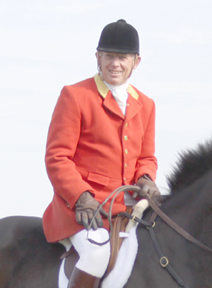
You must be dedicated to your hounds, and aspire to make your pack as good as it can be, and the sport as good as it can be. Everything else supports that, having enough territory, having friendly landowners, and having a field that supports your hounds.
My first challenge as master was deer breaking our hounds – and successfully breaking them was also my first success!
It is important that a master have a vision for what he wants for the sport, a vision that includes hounds, territory, and field. A master should be able to take a long view, as every hunt is going to have short term challenges…every hunt goes through them, new staff, new hounds, changing boards, diminishing territory. Without that long view, you can get discouraged.
Patience is probably the most important trait for a master, bringing along young hounds, developing your pack, working with new staff, bringing along new field members and landowners…but with time and work, it can all come together.
Probably the best advice I received as a new master was from Val Wilson of Potomac, who said to me, “Roger, the one thing about being a master is one day, for sure, you will be an ex master!”
It is all a constant challenge, all of it. It is fun, but it is serious fun – and it is important for masters to make sure they keep it fun.
Elizabeth McKnight, MFH since 1993
Elkridge-Harford Hunt Club
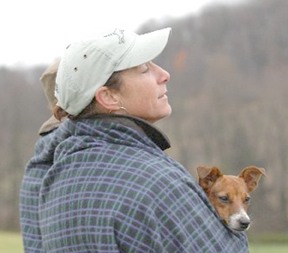
Keep your landowners your top priority; keep them happy and informed at all times. You should know your country.
Communicate with your staff. Trust your hounds.
My first year as master was overwhelming. I got thrust into it not knowing who was what – breeding, staff control, hunt cards, landowners, and who should do what job. Ellie Russell, MFH and Ike Iglehart, MFH did come to the rescue, providing me with some encouraging direction. They gave me some good advice and [being MFH] it’s been great every since.
The most rewarding aspect about being a Master is really learning about hunting hounds, to get to know the hounds individually, how hounds work as a pack and how each hound contributes his or her special traits. It’s knowledge that can not be taught any where but in the hunt field.
The people I have met during my tenure as a master have been an incredible and I now have many new good friends with the same passion for fox hunting.
As for the new women masters, “Don’t worry, girls rock and men suck!” No just kidding! However, I know when the police or an angry landowner shows up, the woman master is usually the one pushed forward to do the talking! But most men will cover your back.
Like I said it is all for fun. The best advice I got was that if you are going to be a Master, then totally commit and put your heart and soul in it.
And enjoy! How lucky we are to have such a great sport!
Dulany Noble, MFH since 1994, honorary huntsman since 2002
Carrollton Hounds
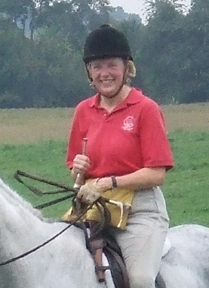
As a master or huntsman, one should always go with their gut feelings, based on their years of experience, of what to do in any given situation. I seem to get myself in the worst trouble by second guessing myself or listening to others advice who may think they know more than I do. Being a baby boomer and a woman, I was brought up to try to please others. As a master, one can never please all the people all the time with decisions that are made. Go with what you know to be right and honorable. Try to stay away from doubting your own strong capabilities.
Your strength comes from your loyal members. Trust them to give you support through the difficult times. I have been amazed by how my membership stepped up to the plate as we went through enormous changes this past year. There was a world of talent and enthusiasm for the sport, the hard work that it involves, that I didn’t even know existed in our membership. They were just waiting to be discovered! For example, our pack had been split by two foxes and some hounds went where they were not supposed to, and we had to stop. I still had hounds out and do you know, not one person in the field went home? They all stayed another hour while I gathered up the errant hounds. Now that is enthusiasm, dedication and loyalty!
Lastly, if you are having a problem, call on your fellow masters from the other hunt clubs that can help you through a given situation. My association with MAWC [Maryland Association of Wildlife Conservation] has given me an opportunity to get to know many of the masters from other Maryland hunt clubs. They are a wonderful source of information, will give you advice and always enjoy talking about our sport.
I am so proud to be master and honorable huntsman of Carrollton Hounds and prouder still of my incredible and supportive members.
Sheila Jackson Brown, MFH since 1996
Green Spring Valley Hounds
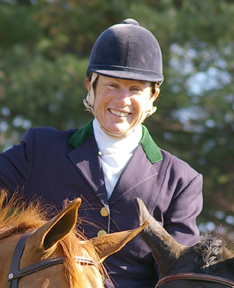
Good luck to all those new MFHs! Anyone who thinks this is a glory job is sadly mistaken. Make no mistake: this is a job.
GSVH is a bit different because we have so many moving parts, and it is really helpful to allocate jobs where the strengths of each individual MFH lies. No one should take on being an MFH short term – there is too much at stake as far as hound breeding and landowner relations are concerned.
We’re exceedingly fortunate to have a terrific new MFH this year – Whit Foster. I was terrified he would say no, but he didn’t and he’s jumped into the fray with both feet flying, thoughtful, helpful, diplomatic and supportive in so many ways. I’m not sure he knew what he was in for, but no one loves his hunting more than Whit. All hunts should be so lucky!
What didn’t go wrong my first year? We had a deaf, disfunctional whip who cried, then the huntsman broke his sternum and was out for six weeks. His first day back on a horse, our hounds ran out of the country (thanks to the deaf whip) and almost caused WWIII in the Valley. Midseason, a large landowner kicked us out, not because of anything we’d done, but for what he thought might prove political muscle with another organization (two months later we were back in). And I survived!
As far as being a woman is concerned, there are definitely advantages in certain situations, but I’ve been cussed at plenty! Just don’t let the guys throw you under the bus. There’s room for all under there. My mother was one of the first female MFHs for GSVH, so I had an idea of what I was up against. The most important thing? Communication.
The MFHA has a nifty tape: New Masters 101. I haven’t listened to it in a while but I’m sure it is still pertinent. The important thing to remember is: Foxhunting is our addiction, it’s fun, and that’s why we work so hard to preserve this sport.
Happy Hunting!
Victoria Crawford, MFH since 1999
Potomac Hunt
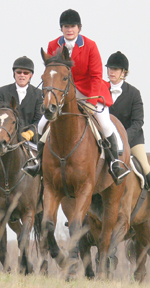
More than possessing skill or expertise, you must show respect for your joint masters. If you divide up the days that you lead the field, and it is not your day, then you must ride in the back as an ordinary member and not try to impose your importance on your joint master
It is challenging to lead the field in a direction that gives the field the optimum view of working hounds and chasing the fox. Sometimes the huntsman goes where “no man has ever gone before” which makes it difficult and sometimes dangerous for the general field to follow. A master must always think about the safety of the field. Ultimately, when you have had that first thrilling chase as the leader of your hunt, the feeling stays with you for the rest of your life.
I enjoy the networking with other MFH’s from hunts all across the US and Canada. I try to attend the seminars and meetings conducted by the MFHA and have met wonderful people through this networking. So many hunts do not hunt fox but they do hunt everything else that moves! I was shocked to learn the types of prey involved all across the US. Through this networking, we met Marion Thorne, MFH and huntsman at Genesee Valley Hunt in upstate NY. Last year, we were invited to the Genesee Valley Hunt to hunt a joint pack of Potomac and Genesee Valley hounds. It was a weekend full of excellent hunting, hunt races, hunt ball, and parties. The hounds were brilliant together and we had so much fun with them that they invited us back again this year.
Patricia Sasscer, MFH 1984–1990, and again since 2000
Marlborough Hunt Club
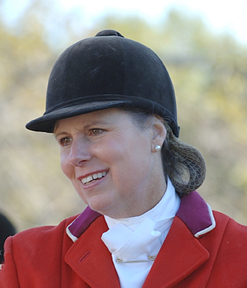
My most difficult transition back in 1984 was to leave behind my role as whipper-in. Quite frankly, I enjoyed going back to my old duty during that 10 year respite from the mastership. Now, however, I enjoy leading a field. I can’t explain that…maturity maybe.
I have to say that the best part of this job is working with joint masters cooperatively. I don’t know if it’s just women, it may simply be personalities and I don’t know why we get along so well, as all three of us have different ways of looking at things. I think it’s a mutual respect. That resonates throughout our membership!
Christine Clagett, MFH since 2000
Marlborough Hunt Club
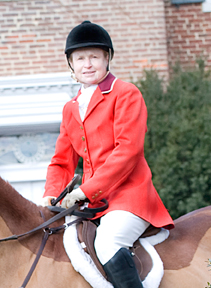
For me, the most challenging thing my first season as master was getting the first field used to a different style of leading the field. Different masters have different styles; some like to anticipate where the fox might run, and then position the field so as to view the fox and the hounds. I prefer to be up with the hounds, so my field had to get used to going more forward.
In general, the most challenging aspect of being a master has been dealing with the new people moving to the country, and getting them accustomed to the rural traditions…what it is like to be part of a rural community and not just an island. We try to be as inclusive as possible, inviting them to functions, and constantly trying to educate as to what foxhunting really is – not what they think it is.
I had no idea the sheer number of hours this was going to take – if you are going to do it properly. There are so many components. We have to keep [current] country open, open new country, keep landowners and members happy, and make sure the club remains viable. As far as joint masters, the more the merrier, we have to spread it around.
I did not realize I was going to have to become a meteorologist! A master has to develop good sources for reliable weather reports. My best sources are a former Air Force Thunderbird pilot and a pilot for Air Force One!
Be generous in your praise to anyone willing to get anything done. There are so many things that need to be done in any club, particularly if you host a race meet, and it is easy to burn out your volunteers. You are going to constantly need new energy and new enthusiasm, so don’t be resistant to change, be willing to listen to the new ideas.
For the women masters: make sure you make friends with backhoe owners! One big storm, and you may have all new stream crossings. I have found that farmers will be a little more reserved with a lady, which has its benefits and drawbacks.
But the bottom line is that there is nothing better than running to hounds in full cry, with a good horse galloping under you. How fortunate we are!
C. Thompson Pardoe, MFH 1996-1999 and again since 2006
Goshen Hounds
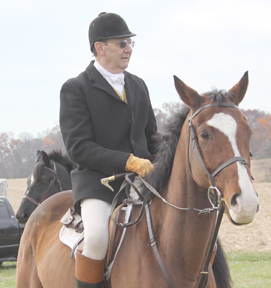
For me, the most rewarding aspect of being a master is being able to watch a pack develop each season as the new entry are brought in and gradually learn to become part of the team. This can be said for the entire staff as well. Each season presents new challenges and watching hounds, whipper-ins, and, yes, the huntsman deal with this evolution in the few short weeks of cubbing and early hunting is a fascinating process. The “reward” is when it comes together and the whole works as a real team.
Probably the most challenging is trying to balance the desires and abilities of those behind me! Some want to fly while others find any pace faster than a slow trot more challenging than they are comfortable with. Staying with a pack of very fast American hounds makes this pretty challenging especially for the “second” field.
Getting staff to understand the delicate psyche of the American hound puppy [is also a challenge]. Our staff has really developed an incredible ability to relate to our hounds in their first year of hunting. This has lead to the ability of several hounds to really come forth and be stars when I fear that some might have been destroyed in the past. Harsh rating of new entry is not only unnecessary, but at least with our American hounds will totally destroy their confidence and desire to please.
Master Stanley Stabler, Goshen’s master for decades, told me when I was first elected joint master, “Tom, don’t look back.” The folks behind you will get over that jump or log, and there isn’t much you can do from the front to help except give them a good lead. Field Masters need to lead, stay with hounds and huntsman, and depend on those behind to understand that and keep up.
Editor’s Note
Readers may have noticed that, while “MFH” and “Master of the Foxhounds” are capitalized, we have used lower case for the for the word “master.” Every publication establishes style standards, and no two publications use the exact same style guide. For instance, notice that the Washington Post lower cases the word “Thoroughbred” and “Quarter Horse,” while most horse publications capitalize breed names.
Horse publications are not consistent in regards to capitalizing the terms “master” and “honorary secretary.” The Equiery has chosen to use the most conservative of style guides, which stipulate that unless the writer is specifically referring to the title as it appears with an individual’s name, the word is not to be capitalized. Thus, we would publish “When Tom Smith, MFH, led his field…” or “When Tom Smith, Master of the Foxhounds, led his field…” because the word is part of his title. However, if the word is being used to describe his role, rather than appearing in his title, it would appear in lower case: “When Tom Smith was serving as master…”
We note that, while this style may not be consistent with other horse publications, this style is consistent with that found in William P. Wadsworth, MFH’s classic Riding To The Hounds In America, published by The Chronicle of the Horse.
And yes, the “FH” in MFH is an abbreviation for the two words “fox hound,” although it is commonly spelled as one word, foxhound.
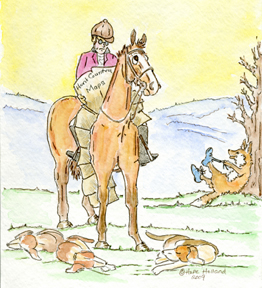
©TheEquiery2009









